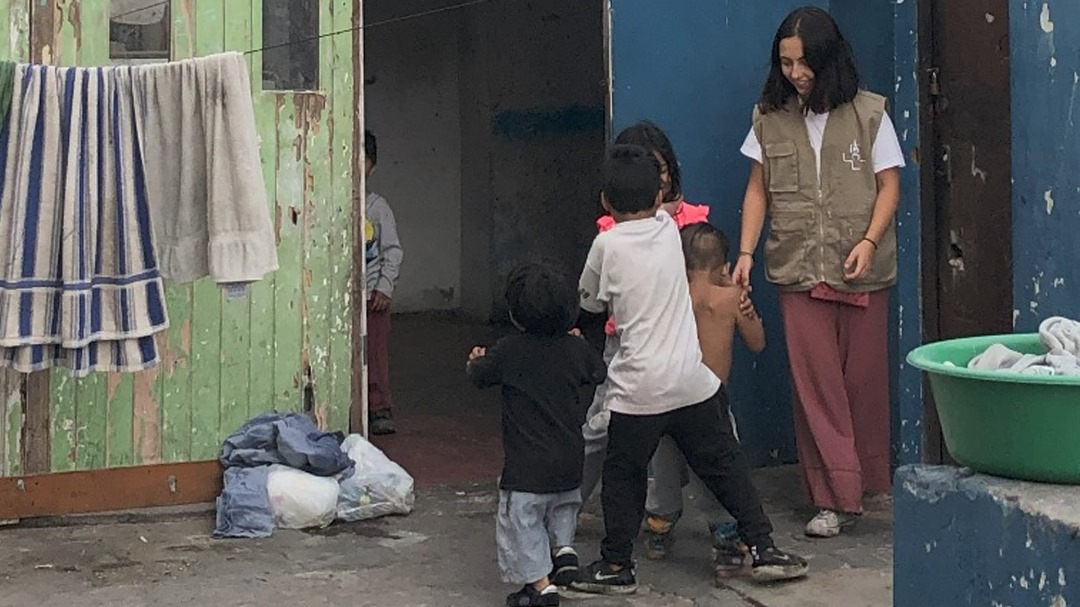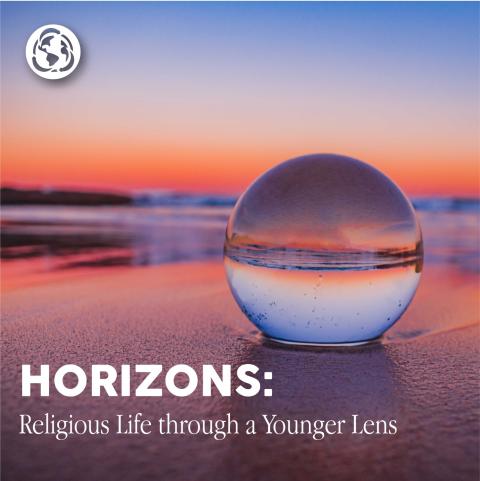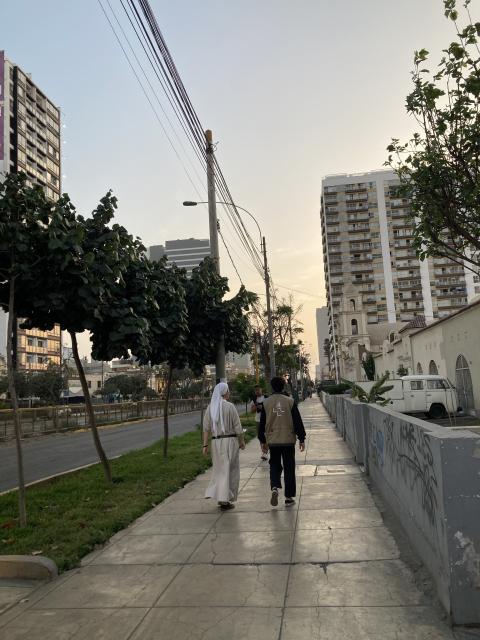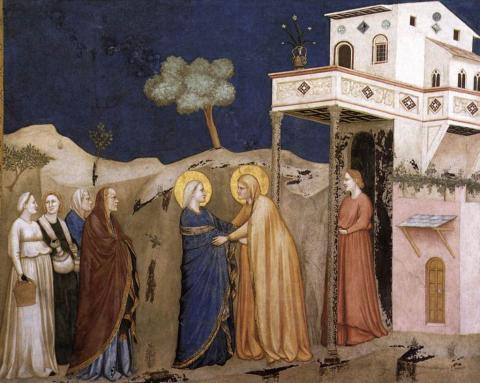
A social ministry volunteer plays with children during a visit to a family in Lima (Begoña Costillo)

The city of Lima is characterized by asymmetries, contrasts and gaps; it is a city of contradictions. The urban landscape transforms dramatically from the center to the peripheries. It often feels like traveling from one country to another within a few hours or even minutes. One can go from a splendid capital with grand buildings, businesses, historic squares, theaters and museums to a neglected area built without plans or projects, marked by the improvisation of survival.
I love strolling through the Plaza de Armas and its surroundings and contemplating its typical wooden balconies, white cornices, and ochre palaces because I breathe in a particular beauty, a light that I have never seen in Europe and that is tremendously attractive to me.
However, when I walk through that other forgotten and unmade country that is just around any corner of the center, or a few minutes away by car, or behind the door of a building of good external appearance, I feel myself magnetized toward it, toward them, with a much greater force.
Those messy, dirty and crowded alleys, markets, street vendors, full of noises and voices, Latin rhythms, and honking horns, "jaladores" that drag you into their stores, that atmosphere calls me, asks me to knock on their doors, to go into their houses, to embrace their people.
"Life unfolds entirely within that room: cooking, sleeping, watching TV, doing homework, washing clothes. … The scene is humanly desolate, yet as we step into that world, beauty whispers, inexplicable, small, drawing closer to us."

A sister walks through the city of Lima with a volunteer from the monastery's social pastoral. (Begoña Costillo)
But what is it about this chaos that absorbs me, that pulls me, that asks me to stay? Why is this noise and these voices, this crowd of tired faces, so beautiful? I do not know if these questions have closed answers, but I know that in this reality, I touch a truth that transcends me.
The other day, once again, I visited the family of Edith (not her real name), who is part of this chaotic and paradoxically beautiful world. We went to see them because it was their eldest son's birthday, and we wanted to share in the joy that Kevin (not his real name) exists and is already 5-years-old! Their other two children are 4-years-old and 2-years-old. My sister and I were accompanied by Angela, a Spanish friend who has spent a month volunteering with us in the social pastoral work we do at the monastery.
As soon as the three children heard our voices behind the door, they burst out with shouts and laughter and eagerly jumped into our arms. We climbed a worn stone staircase with hardly any light, leading to the roof of the building. There, amidst the usual storage of junk, hanging clothes, and TV antennas, was their home and that of five or six other families. Each family lived in a small room made of wood and calamine, about 4 or 5 square meters in size.
Life unfolds entirely within that room: cooking, sleeping, watching TV, doing homework, washing clothes. The bathroom is outside and shared with other families. Everything is messy, unfinished, uncleaned, unorganized. It's a jumble of children, women, men, dogs, scattered clothes, old mattresses on the floor, buckets of water, pots with yesterday's food, toys, garbage, dirt. The scene is humanly desolate, yet as we step into that world, beauty whispers, inexplicable, small, drawing closer to us.
The three children played peek-a-boo and dared us to tickle them. Amidst greetings and laughter, we lit a candle on a chocolate sponge cake, sang "Happy Birthday," and presented Kevin with a remote-controlled car as a gift. Edith then invited us into her room, which contained nothing but a large bed where the four of them sleep, a small kitchen that had run out of gas, and an old refrigerator. Sister Yohnely and I stayed there with Edith while the children played outside with Angela.
While we helped her prepare something to eat, we conversed with Edith. Between anecdotes, she revealed her fatigue and fear, but also her enormous resilience, her ability to find opportunity amidst precariousness, her hope for the future, and her trust in God and herself when she is in His hands. "I know that God has a purpose for me. I know He will not abandon me because He always helps me. That's why I will persevere," she tells us.
"The beauty of God Himself … vibrates in that room with undeniable power."

Giotto de Bondone, "The Visitation," circa 1310, Lower Basilica of St. Francis, Assisi (Wikmedia Commons)
When she speaks of God, her voice breaks, as if he were the ultimate meaning of all her suffering, as if in his name she finds true rest, the doorway to her deepest yearnings for happiness, and the certainty that her children will grow up healthy and happy because love conquers all adversity. It is the humble affliction of the Anawin, the poor of Yahweh, those who know they are stripped of all human strength and, therefore, trustingly surrender themselves to God the Father, whom they perceive with astonishing immediacy.
Edith knows nothing of theology, says few prayers, and rarely attends the temple. Yet, her life hangs on the thread of God's providence, and he is the all who lifts her up after each onslaught of destiny. That's why she prays with her children every night, asking God for what she needs to live that day. She isn't scandalized by the chaos that surrounds her, nor by the disorder of her own life, nor by her exhaustion, nor by her lack of resources, nor by her vulnerability as a mother. She accepts herself as human, small, needy, without resigning herself to disaster. Instead, she continually raises her eyes to heaven, from where she knows salvation comes.
And there it is before us, true beauty. The beauty of God himself, whose presence vibrates in that room with undeniable power. He finds a place amidst precariousness, where there are no shining facades or personal strengths to mask human frailty, but rather the vast expanse of genuine humility that opens wide the doors of home and life to God, allowing him to be the Savior.
Advertisement
It's impossible not to be touched by the presence of fire and water that fills Edith's room. We left there with the certainty of having received God's visit, reminiscent of the day in Ain Karem when the Virgin Mary visited Elizabeth carrying Jesus in her womb. This time, it wasn't us visiting Edith, but her home that concealed Jesus within its walls, making us participants in the joy of the Magnificat. There, we felt the salvation of God, who "casts down the mighty from their thrones and exalts the lowly, fills the hungry with good things, and sends the rich away empty."





